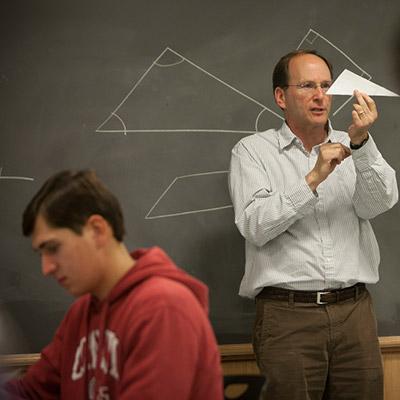As a mathematics major, you can focus on the study of the theoretical aspects of mathematics or explore applications to other fields. You can choose one of seven different concentrations and take a rich variety of courses in analysis, algebra, topology, geometry, probability, statistics and logic to tailor a program that meets your individual needs and interests.
Sample classes
- Statistical Theory and Application in the Real World
- Prove It!
- Introduction to Number Theory
- Nonlinear Dynamics and Chaos
Outcomes
All information below is based on the 2022 First-Destination Survey. Lists are not exhaustive, rather they are a sampling of the data. If you would like more information, please email as_careers@cornell.edu
What can you do with a degree in Mathematics?
Graduate School:
In 2022, 50% of mathematics students embarked on graduate school journeys. They pursued various advanced degrees, with 41% focusing on their PhD, 30% working towards an MEng, 19% dedicated to an MS, and more. Their graduate field interest ranges from Computer Science (41%) to Mathematics (19%) and Physics (14%).
These ambitious individuals have chosen to continue their education at prestigious institutions like Stanford University, the University of Oxford, Tufts University, Hong Kong University of Science and Technology, and Carnegie Mellon.
Employment:
47% of mathematics graduates secured employment, and the majority entered sectors in financial services (31%) and technology (26%). Goldman Sachs and Amazon were the top 2022 employers.
Where 2022 Mathematics Graduates Work
| Employer | Job Titles |
|---|---|
| Amazon | Software Development Engineer |
| Goldman Sachs | Investment Banking Analyst |
| Software Engineer | |
| Institute of Electrical and Electronics Engineers | Associate Data Engineer |
| Lufthansa Systems | Software Engineer |
| Meta | Software Engineer |
| SHOWTIME | Software Engineer |
| UnitedHealth Group | Actuarial Analyst |
